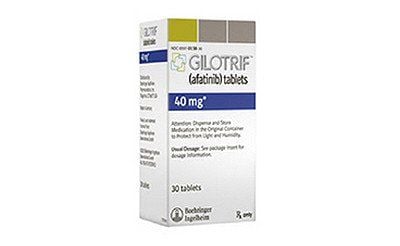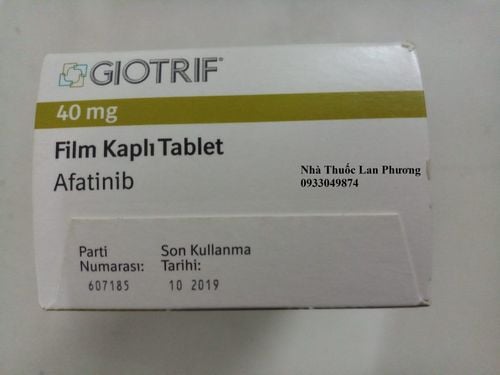This is an automatically translated article.
Alecensa is indicated as monotherapy for the first-line treatment of adults with non-small cell lung cancer and anaplastic lymphoma. What are the uses of Alecensa?1. Uses of the drug Alecensa
Alecensa 150 mg helps to block the action of the ALK protein. This protein is known to be involved in the growth and spread of cancer cells.
Alecensa can also slow or stop the growth of cancer, shrink and reduce tumor size effectively.
Alecensa 150 mg is indicated in the treatment of the following conditions:
Adult subjects with non-small cell lung cancer (NK) or metastatic non-small cell (ALK). Adult subjects with ALK-positive advanced small cell lung cancer who were previously treated with the active ingredient Crizotinib.
2. How to use and dose Alecensa
Patients should pay attention to strictly adhere to the dose and use of Alecensa 150 mg according to the instructions to avoid harm to your health.
2.1. How to take Alecensa 150 mg The drug is to be taken orally and taken with food. When using the drug, swallow the capsule whole and do not crush, chew, dissolve or open the tablet.
Notes when using Alecensa 150 mg:
Before using this medicine you will have a special test to make sure Alectinib is the best treatment for the type of lung cancer you have. You need to carefully read the instructions for use of the drug Alecensa before taking it. Your treating doctor can sometimes change the dose of your medicine, and remember to use it exactly as directed. If you vomit right after taking Alecensa do not take another dose but wait until the time of your next scheduled dose to take it again. Your treating doctor will order you to have some regular laboratory tests to make sure this medicine is not causing harmful effects. Your cancer treatment with drugs may be delayed based on the results of the laboratory indicators. 2.2. Dosage of Alecensa 150 mg Non-small cell lung cancer: You should use a dose of 600mg/1 time, twice a day (total dose is 1200mg). Use in children: The safety and effectiveness of Alecensa 150 mg in children and adolescents (under 18 years of age) have not been studied. Elderly: No dose adjustment of Alecensa 150 mg is required in persons ≥ 65 years of age. Renal Impairment: No dose adjustment is required in patients with mild or moderate renal impairment. Alecensa 150 mg has not been studied in people with severe renal impairment. However, renal elimination of alectinib is negligible and no dose adjustment is required in subjects with severe renal impairment Hepatic impairment: No dose adjustment is required in subjects with mild hepatic impairment. Persons with latent severe hepatic impairment should receive a dose of 450 mg once x twice daily (total dose 900 mg). 2.3. Missed or overdosed Alecensa 150 mg If you forget to take Alecensa 150 mg once, take a dose as soon as you remember, unless it's too close to the time to take your next dose. follow. Absolutely do not take 2 doses of treatment at the same time. The remaining doses of medication should be taken on time as prescribed. Alecensa 150 mg overdose: You need to seek urgent medical attention for the earliest intervention. Note that, when taking a person with an overdose of drugs for treatment, the family member must bring and list all drugs and supplements that the person with poisoning is using.
3. Possible unwanted effects of the drug Alecensa
Patients should notify your doctor immediately if they notice any of the following side effects. Your doctor may recommend reducing your dose or stopping treatment for a short time or stopping treatment altogether:
Yellowing of the skin or whites of the eyes, pain in the right side of the abdomen, dark urine, itchy skin, feeling less hungry. more than usual, nausea or vomiting a lot, feeling tired, bleeding or bruising more easily than usual (potential signs of possible liver problems). New or worsening signs of muscle problems, including unexplained muscle pain or muscle pain that doesn't go away, pain or weakness (potential signs of muscle problems). Fainting, dizziness, and low blood pressure (potential signs of cardiovascular problems, slow heart rate). New or worsening signs include shortness of breath , shortness of breath or cough with or without mucus or fever – signs may resemble those from your lung cancer pathology (signs) potential for pneumonia). Alecensa can cause serious or life-threatening pneumonia during treatment. You also need to tell your treating doctor or healthcare professional if you notice any of the following undesirable effects:
Very common side effects, including:
Blood test results abnormalities to test liver function (high levels of alanine aminotransferase, aspartate aminotransferase, and bilirubin); Abnormal blood test results to check for muscle damage (high blood creatine phosphokinase level); Feeling tired, weak, or short of breath due to a decrease in the number of red blood cells, called anemia; Feeling nauseous or vomiting. If you vomit right after taking a dose of Alecensa, do not take an extra dose, just take your next dose at the usual time; Digestive disorders such as constipation, prolonged diarrhea; Itching or rash on the skin; Swelling caused by fluid accumulation in the body; Rapid weight gain. Common side effects include:
Abnormal blood test results to check kidney function (high levels of creatinine) Vision problems such as blurred vision, loss of vision, black or white dots in the field of vision your vision and double vision (problems with your eyes); Abnormal blood test results to check for liver disease or bone disorders (high alkaline phosphatase level); Inflammation of the oral mucosa; Sensitivity to sunlight: Be careful not to expose yourself to the sun for any length of time while you are taking Alecensa and for 7 days after you stop. You need to wear sunscreen and lip balm with a sun protection factor of 50 or higher to help prevent the risk of sunburn. Change in taste or perception of taste; Rapid decline in kidney function (kidney problems).
4. Drug interactions of Alecensa
Patients may encounter some drug interactions when using Alecensa in combination with some of the following drugs:
Cardiovascular drug Digoxin; Dabigatran etexilate - medicine used to treat blood clots; methotrexate- medicine used to treat certain types of cancer or to treat autoimmune diseases (for example, rheumatoid arthritis); Nilotinib - medicine to treat certain types of cancer; Lapatinib - medicine used to treat certain types of breast cancer ; Mitoxantrone - medicine used to treat certain types of cancer or autoimmune diseases such as multiple sclerosis; Everolimus- medicine used to treat certain types of cancer or used to prevent the body's immune system from rejecting a transplanted kidney, heart, or liver; Sirolimus - medicine used to prevent the body's immune system from rejecting a transplanted kidney, heart, or liver; Topotecan - medicine used to treat certain types of cancer; Medicines used to treat AIDS/HIV (such as Ritonavir, Saquinavir); Medicines used to treat infections, including medicines to treat fungal infections (antifungal drugs such as Ketoconazole, Itraconazole, Voriconazole, Posaconazole) and medicines to treat certain types of infections caused by bacteria (antibiotics) as Telithromycin); John's Wort - herbal medicine used to treat depression; Medicines that prevent seizures or seizures (antiepileptic drugs such as phenytoin, carbamazepine, or phenobarbital); Medicines used to treat tuberculosis such as Rifampicin, Rifabutin; Nefazodone, a medicine used to treat depression; Birth control pills: If you take Alecensa while using birth control pills, oral contraceptives may be less effective. Alecensa may also interact with food and drink. You should be cautious about drinking grapefruit juice, eating grapefruit, or oranges during treatment with Alecensa because they can change the levels of Alecensa in your body.
Please dial HOTLINE for more information or register for an appointment HERE. Download MyVinmec app to make appointments faster and to manage your bookings easily.













